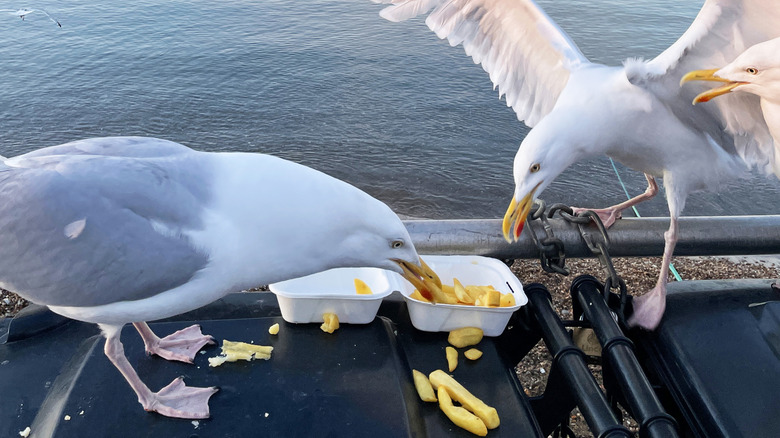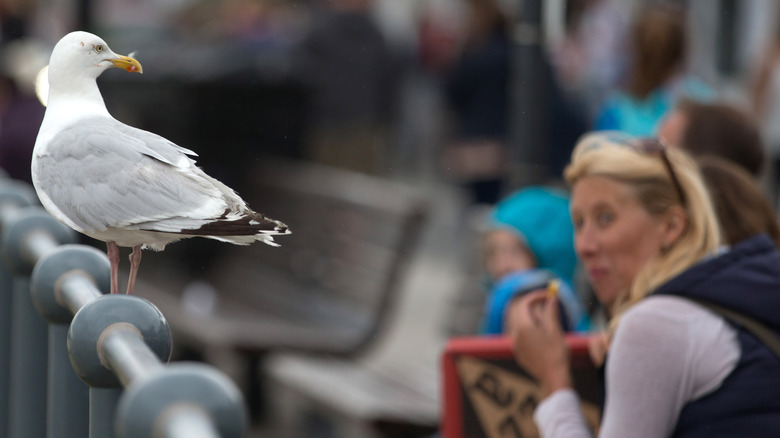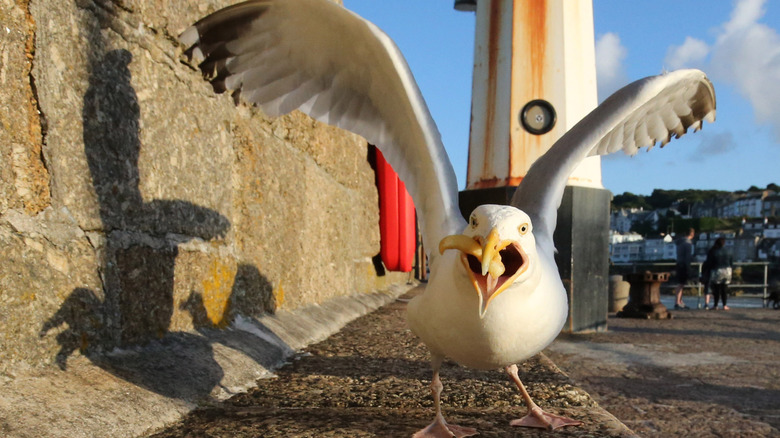This Odd Trick Is Proven To Help Stop Seagulls From Stealing Your Food On The Beach
A trip to a U.K. seaside town wouldn't be the same without the raucous noise of seagulls laughing, squawking, and yelling at each other. They're very vocal birds, and their calls are as much part of the atmosphere as the sound of waves breaking on the beach, music blaring from penny arcades, and the rattle and whoosh of rides at an old-fashioned funfair. Yet, for all they add to the ambiance, the seabirds have a lousy reputation as greedy bullies of the skies, swooping down to relieve the unfortunate and the unwary of their seaside snacks.
Seagulls and their pilfering habits have received more attention than ever in recent years. Now that everyone has a smartphone, there are hundreds of clips of boisterous gulls menacing people for their food — fish and chips are a particular favorite. The U.K.'s national dish might be high on the menu, but gulls are indiscriminate foragers and will go in for pretty much anything they see humans enjoying. One viral video from May 2021 even showed a crafty seabird stealing a sandwich from the chiller cabinet in a grocery store, waiting patiently for someone to trigger the automatic doors so it could make a getaway.
In most cases, these aerial heists are comical or a minor nuisance, but they can be quite intimidating if the birds are scavenging aggressively in flocks. Thankfully, researchers have found a way to deter all but the most flagrant gull: Keep your eye on the birdie.
Which kind of seagulls are the worst for stealing food?
The term "seagull" is a misnomer. No species is called that, but it's a catch-all name used by non-twitchers to identify a large family of seabirds. Several species are native to British shores, and the Herring gull is the quintessential chip-stealer on a sunny U.K. vacation. Large and noisy, they are graceful on the wing while soaring high above the waves, but they can be annoying when they get in your face and want dibs on your snack.
Herring gulls are intelligent birds and sneaky problem-solvers, and decades of human interaction have made them masters of the food grab. Gulls in St. Ives, Cornwall, have been spotted working in pairs, with one bird causing a distraction while a partner in crime darts in from behind to snatch the loot. They are also known to time their visits to school playgrounds, garbage dumps, and other places when food scraps are most plentiful.
Despite their apparent ubiquity at the seaside, Herring gulls are red-listed for conservation as numbers have declined, falling by 60% in the U.K. between 1969 and 2015. With changes to their natural food sources and habitats, they have become increasingly dependent on humans to survive, craving whatever we eat and nesting in urban environments. This has had a significant impact on their diets. Studies show that while they prefer food that has been handled by humans, our grub is not good for their health.
How to protect your food from hungry gulls
Much of the pesky behavior displayed by seagulls is down to survival. Gulls tend to mate for life, and once they're in a pair, they aggressively defend their nests and foraging territory. This accounts for the aggressive squawking you sometimes hear; it is the bird's way of telling others to stay off their turf. While their feeding habits can seem greedy, they are ensuring they grab enough food for themselves and their young. Like other birds, gulls can store provisions in their crop for later.
Although gulls may seem bold and aggressive, stealing food from humans is a risky business for seabirds, and they know when you're watching. This means the best way to protect your food from a scavenging gull is by meeting its beady eye and staring it down. Despite the bad press, research shows that most gulls won't approach food near humans, especially when there are more people around. They are even less likely to snatch a snack if they know their potential victim is vigilant.
Gulls are opportunists and often snatch food from behind, so another good tactic is finding a spot with your back to a wall. Lastly, while it may be tempting to show a little charity and throw them a chip or two, just remember that feeding the hungry birds only makes the problem worse. In some parts of the U.K., it can also prove costly, with on-the-spot fines for sharing your food with seagulls.


